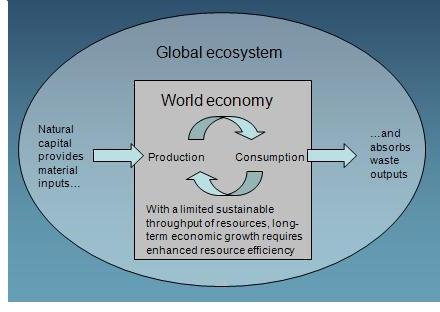The key to answering that question lies in recognising that humanity's economic activities are dependant on the global ecosystem – in particular its capacity to provide resources and to absorb pollution and waste. Crucially, the Earth is a closed material system and that shapes the possibilities for economic growth.
Of course, for some non-renewable resources, including many metals and minerals, security of supply isn't yet a concern; for others, such as fossil fuels, high-tech metals and land, availability is already a problem.
Natural systems can also be seen as a form of capital. If we maintain our natural capital it will provide hugely valuable renewable resources and ecosystem services: generating food and fibres, regulating the climate, purifying water and so on. But over-exploiting our natural capital, for example by taking too many resources or emitting excessive pollutants, will reduce its ability to provide further goods and services.

Natural limits
Put simply, humanity can't keep taking ever more resources from the environment and generating ever more waste. Once the flow of resources through the economy has reached its maximum sustainable limit (and many would argue that we’ve already passed that point for some resources), the only way to maintain economic growth in the long run is to become more resource efficient – finding ways to generate greater returns from the same amount of resources.
Resource efficiency isn’t only valuable because it is essential for sustained economic growth. Reducing environmental impacts also contributes to well-being derived outside the market economy, notably the quality of life that comes from living in a healthy, attractive environment. Moreover, promoting resource efficiency can increase the competitiveness of industry, create jobs, stimulate innovation, boost sectors such as recycling and resource recovery, and help ensure secure supplies of key resources.
In view of these numerous benefits, it is hardly a surprise that resource efficiency has become a key priority for policymaking in Europe. In particular, the European Union has designated resource efficiency as one of seven flagship iniatives within the EU2020 strategy for smart, sustainable and inclusive growth.
Measuring and managing resource use
When resource efficiency is understood in the sense outlined above, it is clear that decision-makers seeking to promote resource efficiency will need to draw on a substantial knowledge base.
To understand resource efficiency, policymakers first need indicators of the extent and nature of resource inputs and their relationship to economic outputs globally, nationally and at smaller scales of production, such as individual sectors. Consumption-focused indicators, which measure the resources used in products and services across their whole life cycle, are also valuable, particularly for understanding and designing policy to address resource use embedded in international trade.
Having identified the trends and drivers of resource use, policymakers need to determine how to enhance resource efficiency. The challenge is enormous and decision-makers in all sectors need information on the policies, tools and technologies that can be deployed within the economy (at national, regional and other scales) to extract more value from resources, while minimising waste and emissions.
Reports on resource efficiency, material resource efficiency and green economy.
Document Actions
Share with others